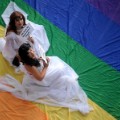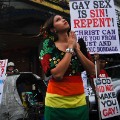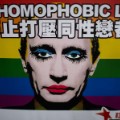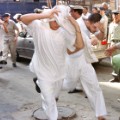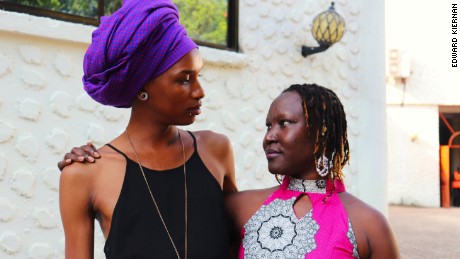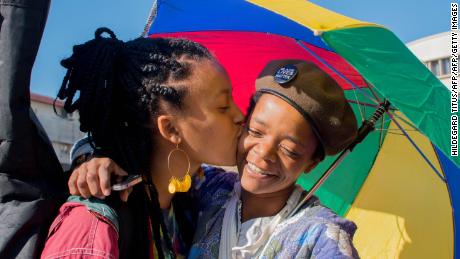(CNN)Kenyans are turning out en masse to cinemas to watch 'Rafiki' a movie about love between two women that was previously banned in the country.
The movie which was banned from screening in the country by the Kenya's Film and Classification Board (KFCB) in April for having a lesbian theme had its ban temporarily lifted by a Kenyan court.
The ruling will allow Kenyans above 18 to watch the movie for the first time in the country for just one week from September 23 until 29th.
Many Kenyans who have watched the film are wondering why the movie was seen as immoral by the country's film censorship board.
"So i just watched #rafiki .....what EXACTLY was Ezekiel Mutua's concern, bearing in mind he pretty much allowed us to movies and series with worse scenes," says a twitter user.
The film is also receiving support from other countries as festivals in the UK and Nigeria are planning to screen it.
Lola Shoneyin, director of the Ake Arts & Book Festival spoke to CNN about why the Nigerian festival will be screening 'Rafiki' in October.
"The Ake Arts & Book Festival is all about developing, promoting and...celebrating all aspects of our culture but especially the core arts. We heard about the film and some of the controversy and we think that it's important that it's screened at this festival which...was established to encourage people to ask questions about what it means to be an African."
Kenyan actress and Oscar winner, Lupita Nyong'o also tweeted her support for the movie when ruling was announced, saying: "...great day for the creative industry in Kenya! Congratulations @wanuri!"
Others have shared touching stories about the impact of 'Rafiki', with one Twitter user saying: "On this day, 39 years ago, in Kenya, my beautiful parents stood side by side and declared their love, despite being told it was "against the natural order". I love that, in celebration of their anniversary, they got tickets to see @wanuri 's #Rafiki in Nairobi. Love always wins."
Kenya's Film and Classification Board (KFCB) said 'Rafiki' was banned because of intent to "promote lesbianism," in the country.
"The film has been restricted due to its homosexual theme and clear intent to promote lesbianism in Kenya contrary to the law," a statement from the board said.
Director Wanuri Kahiu filed a lawsuit earlier this month challenging the censorship board's ruling.
Follow CNN Africa on social media
Read the latest news from Africa and share your thoughts with us on Facebook, Twitter and Instagram
Kahiu's lawyers argued that banning the film violated her constitutional right to free speech and free expression as an artist.
The temporary ban allows 'Rafiki' to be eligible to be submitted for the Best Foreign Language film at next year's Academy Awards.
According to the Academy's rules, a film must be shown in the country where it was produced for seven consecutive days to be eligible.
Reacting to the court judgment, Kahiu posted an emotional statement on Twitter.
"I am crying. In a french airport. In SUCH Joy! Our constitution is STRONG! Give thanks to freedom of expression!!!! WE DID IT! We will be posting about Nairobi screening soon," she said.
"The debate on 'Rafiki' is not about freedom. It's about our essential values. The hullabaloo about artistic freedom is a decoy. The big agenda is to corrupt our culture and moral values, and to kill the institution of family," says the head of KFCB Dr Ezekiel Mutua on Twitter.
The movie made history in May this year as the first Kenyan movie to premiere at the Cannes film festival.
Inspired by the 2007 Caine Prize short story winner "Jambula Tree" by Ugandan writer Monica Arac Nyeko, 'Rafiki' which means 'friend' in Swahili is the story of friendship and tender love that grows between two young women amidst family and political pressures, according to the film's promotional material.
Being gay in Kenya
Kenya is highly conservative, and a vast majority of people hold negative views about LGBT people.
Kenya's penal code criminalizes "carnal knowledge against the order of nature." Anyone found engaging in gay or lesbian activities could face up to 14 years in prison.
Prompted by public uproar, the police arrested two men in 2015 and conducted forced anal examinations on them to prove they were gay.
In March this year, anal examinations were ruled unconstitutional by a Mombassa court of appeal. The court found that conducting forced anal examinations on people accused of same-sex relations is illegal, according to Human Rights Watch.
The ruling reversed a 2016 High Court decision that had upheld the Kenyan authorities' use of forced anal exams on men suspected of being gay.
Why was "Rafiki" banned?
The board said 'Rafiki' had same-sex scenes and undertones which were not in the script initially submitted for approval.
The director was asked to remove the scenes, but she refused.
The KFCB said in the statement that foreign sponsors who intend to introduce and normalize homosexuality in Kenya through movies should desist from such acts.
"Kenya is a country with a culture, beliefs and shared values which must be respected," it said.
"Hare-brained schemes by foreigners funding film producers in Kenya to promote homosexuality in the name of equality and inclusion will be exposed and strongly resisted," a spokesman for the board said.
Ezekiel Mutua who heads the censorship board said police would be present during the screening of 'Rafiki,' to ensure that only people over 18 were watching the film.
"It's a shame that someone thinks that gay content is what should define the success of the film industry in Kenya. Nollywood is doing wonders, and they don't pride in such nonsense!" he posted in a tweet.











